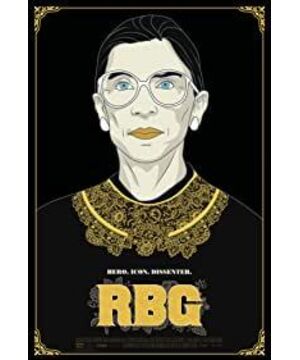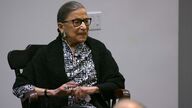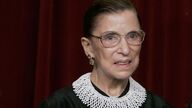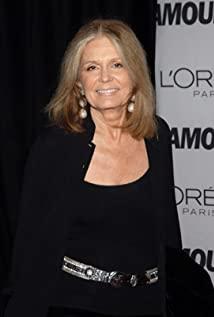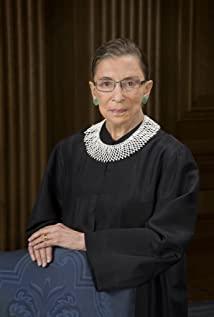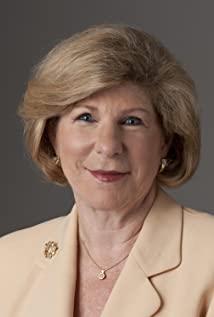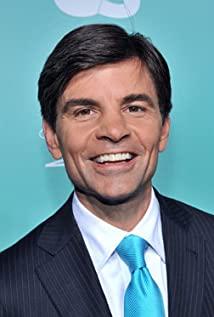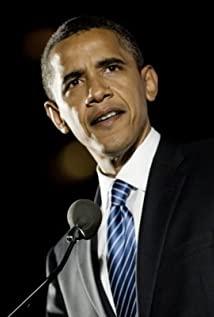1. Documentary
The narrative of this film is mainly based on time, and briefly introduces the life of Ruth Bader Ginsburg, supplemented by the famous affirmative action cases in the United States and the love and praise of RBG by public opinion. But I think this film, as a character documentary, is still relatively thin.
Although this film focuses on the agency cases, litigation claims, majority opinions, and dissenting opinions that embody Kinsberg's idea of equality, it is a pity that these are only superficial, and the "fight for equal rights" is extracted. This is totemize and label the characters, causing other details to be ignored, such as not placing RBG's affirmative thought in a broader and deeper social context, not analyzing Ginsburg's role in the Supreme Court justice Factional positions, but these I think are necessary for a fuller understanding of the character.
The introduction of this film is not in-depth in both vertical and horizontal directions. Vertically, the film restricts Ginsburg's legal concept to a static level, lacking a progressive observation of the entire thought development process. For example, compared to his early career as a lawyer, Ginsburg paid more attention to consensus after entering the Supreme Court, and would rather moderate his views to obtain consensus within Bench.
Horizontally, there is also a lack of important supplements to certain events in combination with the political and social factors at that time. For example, her election to the Supreme Court was one of the fruits of the second feminist movement in the United States in the 1960s and 1980s. If this social factor is ignored , it may be forgotten that the ultimate driving force for social progress is not tied to RBG individuals, but is deeply rooted in the voices of feminism in society. Moreover, it is necessary to point out that Justice Ginsburg has not actually been the center of the Supreme Court. In most cases, Ginsburg is a member of a number of liberal justices, trying to push the judicial wheel toward freedom with his colleagues. turn to ism. Despite the spring of liberalism, the last few years of Clinton's term of office, the liberalism made great strides, and after the millennium, Justice Kennedy gradually became more liberal, but in the end, it was no match for Republican President Bush and Trump to hold the nomination right, and the Supreme Court gradually moved to the right. . After the court moved to the right, Ginsburg wrote more dissent opinions during this period. Due to the political background and the composition of judicial personnel, it was difficult for Ginsburg's judicial ideas to be translated into precedents. So, perhaps the fuller history that the documentary doesn't point out is this: Ginsburg was the voice of justice in the period of rising liberalism, flourishing in the field of affirmative action for women, but as conservatism rose, the role of the judicial voice was shackled a lot. However, this does not prevent Ginsburg's dissent from being remembered as subtle, profound and rational.
Legal professionals will inevitably find fault with this documentary. Therefore, it is still necessary to "make up the pen": the "thinness" criticized in the previous article can be regarded as an advantage from another point of view. For those viewers who knew Ginsburg for the first time, the documentary successfully created a distinct character image of an "equal rights fighter" and "notorious RBG". The audience will be deeply impressed by the fact that there was such a female Supreme Court justice who ended her life. He spent his life defending the Civil Right Legislation, defending the basic values of the Constitution, and waving the banner of the "spirit of liberty" high as long as he was still at work in the law.
2. Ginsburg
Ginsburg was a great justice and a very charismatic person. Ginsburg has idealistic feelings, and as early as 1973, she put the concept of feminism into judicial practice - the Frontiero v. Richardson case mentioned in the documentary, and she even set precedent as the ultimate goal of litigation. Idealism guides forward, honesty is not deceitful. She stands on the wave of affirmative action, and she is also a part of the wave of affirmative action. She is noticed by people because of her high position, and is loved and admired by many people because of her intelligence, knowledge and personality.
Ginsburg's judicial decisions are often subtly and profoundly written. In her dissent in Burrell v. Hobby Lobby Stores Inc., she wrote a deafening statement: Women's social and economic equality benefits from their control over reproduction ( main idea). This was originally a case where an employer refused to provide contraceptive medical insurance on the grounds of religious belief. According to personal speculation, this case should be debated around freedom of religious belief. However, Ginsburg believes that religion is still inferior to women's freedom. , such a profound insight is truly admirable.
When Ginsburg passed away in 2020, America mourned.
Ginsburg once quoted a 20th century feminist activist: "I ask no favor for my sex, all I ask about from my brother, is that they take their feet off our necks." The torch of equality will take multiple generations According to legend, the slogan needed to be injected into the faith of a new generation, and Ginsburg was one of the spokesmen of her era.
3. Other
While watching the documentary, I couldn't help but compare the affirmative action between China and the US. The United States has experienced three waves of feminism, and the third wave is still going on today.
According to the introduction of the documentary, during the second feminist movement, there were obvious improvements in American legislation. For example, married women enlisted in the military to receive subsidies like men, and men should apply for social security benefits for single parents as well as women. In the 1970s, some state laws still blatantly discriminated against women, but those laws were gradually repealed as affirmative-rights precedents were established. As for income issues directly related to socioeconomic status, in 1996, women in the United States fought a lawsuit for equal pay to the Supreme Court. During the Obama administration in 2009, the Fair Pay Act was passed, and Ginsburg's expectation of "equal pay for equal work" "become black and white. The beautiful country does have a reason to be strong and great.
my country's legislation may benefit from the advantages of a post-development country. Marriage and family law has been a "gender-blind" law since its birth. This brand-new country advocating Marxism should be proud of itself. Contemporary feminist ideology is surging, but it is difficult to return, and misogynistic thoughts are still lurking in dark and remote corners. Many logics are based on injustices that discriminate against women, ranging from family rearing responsibilities to unequal pay for equal work in the workplace, which are reflected in a habit of social operation. To change this heavy inertia requires a stronger voice and awakening. In the long run, the development of women's rights in my country is still very young. We have not yet had a bill to specifically address the issue of equal rights, and the voice of women's rights has not yet entered the political arena. From the trend of thought to the implementation, this republic country still has ups and downs to go through.
4. Conclusion
Ginsburg quoted Judge Lendt Hand in her nomination confirmation meeting: "Spirit of liberty filled in constitution must lie first and foremost in the hearts of men and women who compose this great nations. Our community, where the least shabby heard and considered side by side with the greatest. I will keep that wisdom in my mind as long as I'm capable of judicial services." In the hearts of men and women of the kingdom, become the foundation. Small individuals should be heard and respected, and together they can achieve immortality.)
This is a gift to you, and to myself.
View more about RBG reviews


